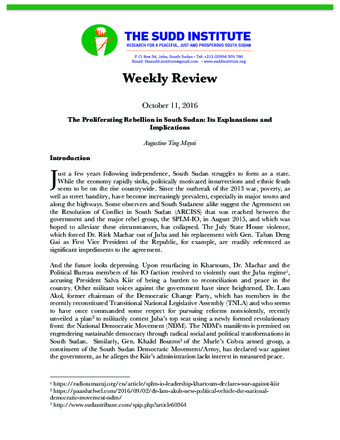The Proliferating Rebellion in South Sudan: Its Explanations and Implications
Publication Summary
For nearly a decade now, several armed groups have emerged all over the country, with some of them sometimes signing agreements with the government that last only a very short time. What normally follows, as historically evident, is a cycle of rebellions and sojourning political settlements, with rebel leaders shuttling between Juba and the trenches. This cycle between insurrection and peace incredibly threatens long-term stability in South Sudan, with innocent civilians made vulnerable to all kinds of negative consequences. But why has rebellion become so entrenched an instrument of airing political grievances in the nation? Several explanations readily come to mind and which this review endeavors to highlight. Such explanations include narrowed political settlements, increasingly tightening political space (for dissent), and apathy towards fundamental reforms.
Augustino Ting Mayai's Biography
Augustino Ting Mayai is the former Managing Director of the Sudd Institute. He is a founding Research Director of the same institution, serving in this capacity for a decade. He holds a Ph.D. in Sociology, with concentrations on demography and development from the University of Wisconsin-Madison. He currently studies how state effectiveness affects child health outcomes in South Sudan and Ethiopia. Dr. Mayai has written extensively on South Sudan’s current affairs. August is the current Chair (Statistician General) of the National Bureau of Statistics, Government of South Sudan.

